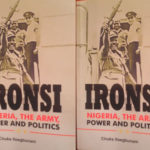CONTINUED FROM LAST WEEK
- From Lugard to Richards
WE have seen that by January 1, 1900, four distinct administrative units had emerged. They were: (1) The Colony and Protectorate of Lagos under a Governor; (2) The Protectorate of Southern Nigeria under a High Commissioner; (3) The Protectorate of Northern Nigeria under a High Commissioner; and (4) The Egba United Government under the Alake of Abeokuta and his Chiefs. British officials in charge of the first three were responsible to the Colonial Office. But this had not always been the case.
Before 1900, British officials in Nigeria were responsible to three different authorities. Those in the Niger Coast Protectorate, later known as the Protectorate of Southern Nigeria, were responsible to the Foreign Office; those in the Colony and Protectorate of Lagos, to the Colonial Office; while those in charge of the areas which later became the Protectorate of Northern Nigeria were responsible to the Board of Directors of the Royal Niger Company. This extra-ordinary administrative set-up was streamlined in 1900, and fully rationalised in 1914 under the Governor-Generalship of Lord (then Sir Frederick) Lugard.
An imperialist of a very deep dye, Lord Lugard was an exceedingly able and resourceful administrator, and a brilliant soldier. To him, more than to anyone else, belongs the credit and discredit for setting Nigeria on a course which Nigerian nationalists and patriots feel themselves obliged to pursue, albeit with mixed feelings, till the present day. We shall have more to say on this assertion in Chapter 4. For the time being, let us try to learn, among other things, a little more about this man and his doings in Nigeria. His first visit to Nigeria was in 1894. He was then a soldier with the rank of Captain; and he had come here, on behalf of the Royal Niger Company, to negotiate treaties with the Chiefs of Borgu. It was his speed and skill in the conduct and conclusion of the negotiations that won Borgu for Britain and Nigeria as against France and Dahomey. He had beaten the French to it by only five days.
After a spell of service with the British East India Company, he reappeared on the Nigerian scene in 1897, as Brigadier-General. He had been commissioned by the British Government to go to West Africa to raise a local military force which was to be officered by men from the British army. The immediate object of this arrangement was to cope with the threats of French aggression ‘on the western boundaries of Northern Nigeria. But it was also intended that this force, together with three companies of the West Indian Regiment, would combine to protect British possessions in
West Africa. He executed his mission successfully, and the Royal West African Frontier Force, with headquarters at Jebba, was born. It must be mentioned that the R.W.A.F.F. remained in being for 60 years. It was disbanded, and reconstituted on strictly national basis when Ghana pulled her men out of it on her attainment of independence in 1957.
On January 1, 1900, Lugard became High Commissioner of the Protectorate of Northern Nigeria. As we have noted, one of the things which led to the revocation of the Charter of the Royal Niger Company was its inability to bring the bulk of the areas within its allotted jurisdiction under effective administrative control and, hence, British influence. As a matter of fact, when the Protectorate of Northern Nigeria was inaugurated in 1900, slave-raids, slave-trade, and slavery were prevalent in most parts of the North, and internecine wars continued to be waged. But within the space of six years, Lugard had, by force of arms and clever diplomatic moves, subdued the North and pacified it. He had, into the bargain, established orderly government, as well as effective
British influence throughout the region.
The size of Northern Nigeria, coupled with the difficulties of communication and of means of transportation, presented formidable administrative problems. ‘Direct administration of such an area, under
the prevailing conditions, would have involved the British Government in extremely heavy expenditure. A large army of
administrative and military personnel of British origin would have been required. The expenditure necessary to maintain such a huge personnel would have been considered by the British Government to be quite disproportionate-to Nigerian prospects. And, in any case, it would have been impossible to attract British citizens of the right type and education, in those numbers, for service in Nigeria, which, like other countries on the west coast of Africa, had earned the odious reputation of being the’ White Man’s Grave’.
Furthermore, direct British Rule would have almost implacably antagonised, and embittered another imperial power, indigenous to Africa, the Fulani, which had preceded the British to the North by about 100 years. Indeed, with other ‘principalities and powers’ prowling around for more and more of the African loot, and waiting
for Britain’s injudicious and unguarded hours, such a course would almost certainly have had the effect of driving the ruling class in the North into the imperialist embrace of the French or the Germans.
CONTINUES NEXT WEEK






